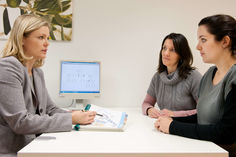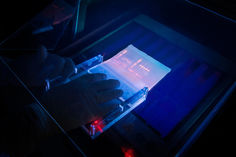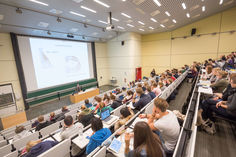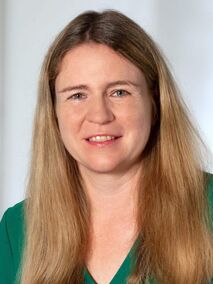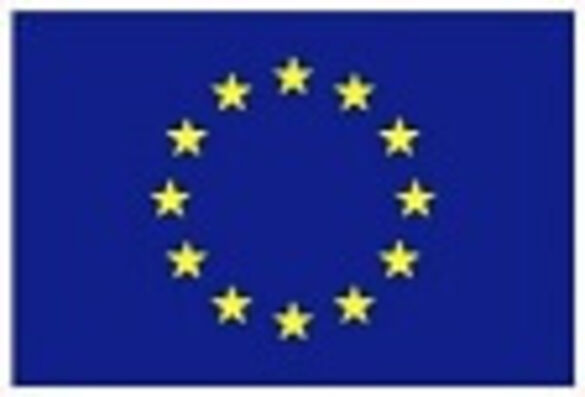- Sektion Nephrogenetik (AG Simons)
- Seniorprofessur Prof. Rappold
- Molekulare Neurogenetik (AG Berkel)
- Kardiogenetik (AG Hoffmann)
- Genomisches Neugeborenenscreening
- Translationale Neurowissenschaften (AG Althammer)
- Neurogastrogenetik (AG Mellein)
- Regulierung der Transkription bei Entwicklungsstörungen (AG Laugsch)
- Genetik neurologischer Entwicklungsstörungen (AG Schaaf)
- Mausmodelle für neurologische Entwicklungsstörungen (AG Fröhlich)
- Molekulare Humangenetik (AG Boutros)
- Forschung der genetischen Poliklinik
- Forschung in der Diagnostik
- Publikationen
Molekulare Neurogenetik (AG Berkel)
Research Group
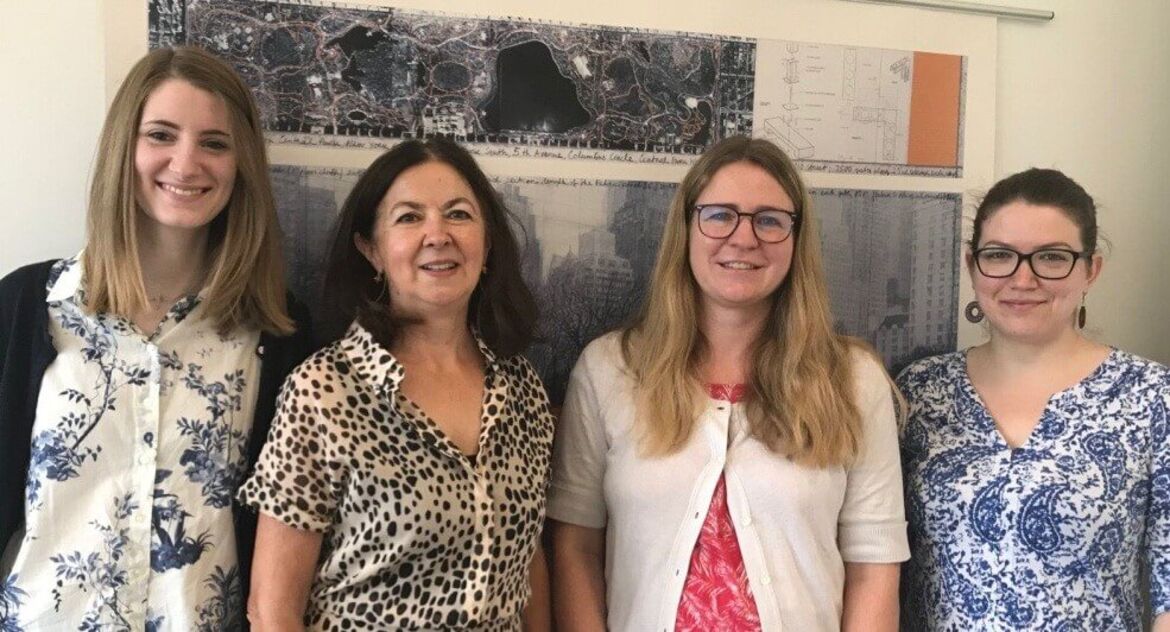
Dorothea Schall (PhD student), Gudrun Rappold (director), Simone Berkel (Dr. rer. nat.), Flavia-Bianca Cristian (PhD student) (from left to right)
Research Focus
Our primary interest is to better understand the genetic cause of neurodevelopmental disorders such as intellectual disability (ID) and autism spectrum disorders (ASD). We identified mutations in the SHANK2 gene, which encodes a master scaffolding protein in glutamatergic synapses in the brain causing the pathogenesis of ID and ASD (Berkel at al., 2010).
Beyond the identification of mutations contributing to disease, our main interest is to elucidate the cellular consequences of mutations identified in affected individuals and to unravel patho-mechanisms in neuronal cells from mouse and humans (Berkel at al., 2012; Rafiullah et al., 2016; de Sena Cortabitarte et al., 2018; Berkel et al., 2018). We are currently using human-induced pluripotent stem cells (iPSCs) from both patient and control individuals, in combination with CRISPR/Cas9 genome editing. iPSCs will be differentiated into neuronal stem cells and forebrain neurons to elucidate the impact of gene mutations in human neurons. Different cellular properties will be investigated with regard to proliferation, apoptosis, neuronal differentiation and activity, including analysis of the transcriptome and proteome. The understanding of the pathogenesis of autism and intellectual disability gained by these studies can be used to develop therapeutic strategies.
PRIME
We are part of a European-funded initiative that has been launched to explore how common molecular mechanisms may link metabolic disorders, especially type 2 diabetes and obesity, with brain disorders such as Alzheimer's disease, obsessive-compulsive disorders and autism spectrum disorders. The 5-year long project termed ‘PRIME’ (Prevention and Remediation of Insulin Multimorbidity in Europe) aims to unravel how brain disorders throughout life can be traced to alterations in insulin signaling and how this relates to the somatic diseases type 2 diabetes and obesity (https://prime-study.eu/).
Publications
Unsicker, C., Cristian, F.B. , von Hahn, M., Eckstein, V. Rappold, G.A., Berkel, S.: SHANK2 mutations impair apoptosis, proliferation and neurite outgrowth during early neuronal differentiation in SH-SY5Y cells.
Sci Rep, 2021 Jan 22
Cristian, F.B., Köppel, A., Janssen, J., Utikal, J.S., Rappold, G.A., Berkel, S.: Generation of two hiPSC lines from a patient with autism spectrum disorder harboring a 120 kb deletion in SHANK2 and two control lines from each parent.
Stem Cell Research, 2020 Sep 19
Berkel, S., Eltokhi, A., Fröhlich, F., Porras-Gonzalez, D., Rafiullah, R., Sprengel, R., Rappold, G.A.: Sex Hormones Regulate SHANK Expression.
Front Mol Neurosci. 2018 Sep;11:337
de Sena Cortabitarte, A., Berkel, S., Cristian, F.B., Fischer, C., Rappold, G.A.: A direct regulatory link between microRNA-137 and SHANK2: implications for neuropsychiatric disorders.
J Neurodev Disord. 2018 Apr;10(1):15
de Sena Cortabitarte, A., Degenhardt, F., Strohmaier, J., Lang, M., Weiss, B., Roeth, R., Giegling, I., Heilmann-Heimbach, S., Hofmann, A., Rujescu, D., Fischer, C., Rietschel, M., Nöthen, M. M., Rappold, G. A., Berkel, S.: Investigation of SHANK3 in schizophrenia.
Am J Med Genet B Neuropsychiatr Genet. 2017 Jun;174(4):390-398.
Rafiullah, R., Long, A.B., Ivanova, A.A., Ali, H., Berkel, S., Mustafa, G., Paramasivam, N., Schlesner, M., Wiemann, S., Wade, R.C., Bolthauser, E., Blum, M., Kahn, R.A., Caspary, T., Rappold, G.A.: A novel homozygous ARL13B variant in patients with Joubert syndrome impairs its guanine nucleotide-exchange factor activity.
Eur J Hum Genet. 2017 Dec;25(12):1324-1334
Rafiullah, R., Aslamkhan, M., Paramasivam, N., Thiel, C., Mustafa, G., Wiemann, S., Schlesner, M., Wade, R.C., Rappold, G.A., Berkel, S.: Homozygous missense mutation in the LMAN2L gene segregates with intellectual disability in a large consanguineous Pakistani family. J. Med. Genet. 2016 Feb;53(2):138-44
Peykov, S., Berkel, S., Schoen, M., Weiss, K., Degenhardt, F., Strohmaier, J., Weiss, B., Proepper, C., Schratt, G., Nöthen, M. M., Boeckers, T.M., Rietschel, M., Rappold, G.A.: Identification and functional characterization of rare SHANK2 variants in schizophrenia. Mol Psychiatry. 2015 Dec;20(12):1489-98.
Berkel, S., Tang, W., Treviño, M., Vogt, M., Gass, P., Scherer, S. W., Sprengel, R., Schratt, G., Rappold, G. A.: Inherited and de novo SHANK2 variants associated with autism spectrum disorder impair neuronal morphogenesis and physiology. Hum. Mol. Genet. 2012 Jan; 21(2):344-57.
Berkel, S., Marshall, C.R., Weiss, B., Howe, J., Roeth, R., Moog, U., Endris, V., Roberts, W., Szatmari, P., Pinto, D., Bonin, M., Riess, A., Engels, H., Sprengel, R., Scherer, S. W., Rappold, G. A.: Mutations in the SHANK2 synaptic scaffolding gene in autism spectrum disorder and mental retardation.
Nat. Genet. 2010 Jun; 42(6):489-91.
- Sektion Nephrogenetik (AG Simons)
- Seniorprofessur Prof. Rappold
- Molekulare Neurogenetik (AG Berkel)
- Kardiogenetik (AG Hoffmann)
- Genomisches Neugeborenenscreening
- Translationale Neurowissenschaften (AG Althammer)
- Neurogastrogenetik (AG Mellein)
- Regulierung der Transkription bei Entwicklungsstörungen (AG Laugsch)
- Genetik neurologischer Entwicklungsstörungen (AG Schaaf)
- Mausmodelle für neurologische Entwicklungsstörungen (AG Fröhlich)
- Molekulare Humangenetik (AG Boutros)
- Forschung der genetischen Poliklinik
- Forschung in der Diagnostik
- Publikationen
